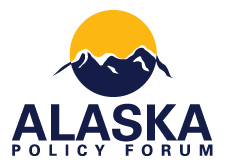
On March 5th, 2021, Alaska Policy Forum teamed up with the Grassroot Institute of Hawaii to provide testimony to the Alaska Senate Labor & Commerce Committee, supporting Senate Joint Resolution 9, urging the United States Congress to exempt cruise ships from certain provisions of the Passenger Vessel Services Act and other applicable provisions of federal law for the period during which Canadian ports are closed to cruise ships carrying more than 100 people; and urging the President of the United States not to fine or take actions against cruise ships sailing to the state. Click here to open a printable PDF of the testimony.
March 5, 2021
To: Alaska Senate Labor & Commerce Committee
 Senator Mia Costello, Chair
Senator Mia Costello, Chair
Senator Roger Holland, Vice Chair
Senator Josh Revak, Member
Senator Gary Stevens, Member
Senator Elvi Gray-Jackson, Member
From: Alaska Policy Forum, Bethany Marcum, CEO
Grassroot Institute of Hawaii, Joe Kent, Executive Director
RE: SJR 9 — URGE EXEMPTION FOR CRUISE SHIPS
Alaska Policy Forum and the Grassroot Institute of Hawaii support the resolution being considered by your committee, Senate Joint Resolution 9, that urges Congress to exempt Alaska from the federal Passenger Vessel Services Act due to its adverse impact on the state’s struggling tourism industry.
According to the resolution, Alaska hosted more than 2.26 million visitors in 2019, of which 1.34 million arrived by cruise ship, accounting for 90% of the visitors to Southeast Alaska.[1] The Resource Development Council for Alaska estimates that before the COVID-19 crisis, one in 10 Alaska residents worked in tourism, thanks to visitor spending totaling more than $2.2 billion a year.[2]
But now almost all of that has disappeared. The COVID-19 lockdowns that started in March 2020 forced the suspension of virtually all cruising worldwide, crushing tourism economies around the globe. Now, a year later, things are starting to open up. But for Alaska tourism, there still are some hurdles.
Even though the U.S. Centers for Disease Control and Prevention eased its ban on cruising in October 2020, Canada continues to prohibit cruise ships from landing at any of its ports, and intends to keep doing so until at least February 2022.[3]
This is a problem for Alaska tourism because under the PVSA, only ships flagged and built in the U.S. and mostly owned and crewed by Americans may transport passengers from one U.S. port to another. Foreign-flagged and built vessels may transport passengers from one U.S. port to another, but only if they also stop at a foreign port, which in this case would be in Canada.
Incredibly, there is only one large ship that qualifies under the PVSA to transport passengers between U.S. ports: the MS Pride of America, a 2,500-passenger, mostly foreign-built vessel that received a congressional exemption from the PVSA to sail in U.S. waters, but only in Hawaii.[4]
There are smaller PVSA-qualified ships that serve the Alaska market, but collectively they bring in only a fraction of the visitors that the larger foreign-flagged and built ships do.[5]
The PVSA was enacted in 1886, long before either Alaska or Hawaii joined the United States. Its purpose was to protect U.S. maritime jobs, but it has failed in that mission. The last large ocean cruise liner built in a U.S. shipyard was in 1958, and the only large PVSA-qualified ship still remaining operates under an exemption and is restricted to Hawaii.
Considering the ineffectual nature of the PVSA, there seems to be little or no reason to continue it, especially when the costs so clearly outweigh the benefits.
Even during pre-COVID-19 times, the act was a harmful restraint on trade.
As the Grassroot Institute of Hawaii explained in its October 2020 report “Cruising in Hawaii,” the PVSA has limited the Aloha State’s tourism potential, too.[6]
In the remote Hawaii market, the PVSA has discouraged cruise ship tourism by requiring foreign vessels to stop at foreign ports such as Ensenada, Mexico, or Fanning Island, Kiribati, 1,000 miles south of the Aloha State. The law is one reason cruise ship visitor arrivals to the islands are a fraction of those to Alaska.
Now with Alaska feeling the brunt of the PVSA’s role in restraining economic growth, it is clear that this 135-year-old protectionist maritime law needs attention.
Hawaii and Alaska have a history of working together to push for less costly federal shipping regulations. Back in the 1960s and 1970s, bipartisan lawmakers from both states tried to reform the protectionist Jones Act, but to no avail.[7] Today, we want to rekindle this spirit of cooperation and support Alaska’s plea that Congress grant it relief from an archaic and expensive law.
As University of Hawaii professor emeritus of economics James Mak concluded about the PVSA more than 10 years ago, “The current, and antiquated law imposes costs on a lot of people but confers few, if any, national benefits.”[8]
Mak went on to recommend that the PVSA be repealed. It is also possible it could be meaningfully reformed. At the very least, however, a waiver should be granted to help Alaska’s tourism industry recover after the nonexistent cruise season of 2020 — and the Alaska Policy Forum and the Grassroot Institute of Hawaii support Senate Joint Resolution 9 as a step toward that goal.
Sincerely,
Bethany Marcum Joe Kent
CEO Executive Vice President
Alaska Policy Forum Grassroot Institute of Hawaii
________________
[1] ”Alaska Senate Joint Resolution 9: Urge Exemption For Cruise Ships,” Legiscan.com.
[2] “Alaska’s Tourism Industry,” Resource Development Council for Alaska, accessed March 4, 2021.
[3] Johanna Jainchill, “With Alaska season on the ropes, lines challenged on cabotage law,” Travel Weekly, Feb. 15, 2021.
[4] “Maritime Law Exemption: Exemption Provides Limited Competitive Advantage, but Barriers to Further Entry under U.S. Flag Remain,” Report to the Chairman, Committee on Commerce, Science and Transportation, U.S. Senate, U.S. General Accounting Office, February 2004. See also “Pride of America,” Wikipedia, accessed March 3, 2021.
[5] Personal correspondence with Craig Dahl, executive director of the Greater Juneau Chamber of Commerce, March 2, 2021.
[6] Jonathan Helton, “Cruising in Hawaii: How the federal government’s 1886 Passenger Vessel Services Act has limited the Aloha State’s tourism potential,” Grassroot Institute of Hawaii, October 2020.
[7] Jonathan Helton, “Remember when U.S. Sen. Daniel Inouye led the charge for Jones Act reform?” Grassroot Institute of Hawaii, Oct. 25, 2020.
[8] James Mak, Christopher Sheehey and Shannon Toriki, “The Passenger Vessel Services Act and America’s Cruise Tourism Industry,” Working Paper No. 2009-1, University of Hawaii Economic Research Organization, Jan. 22, 2009, p. 27.